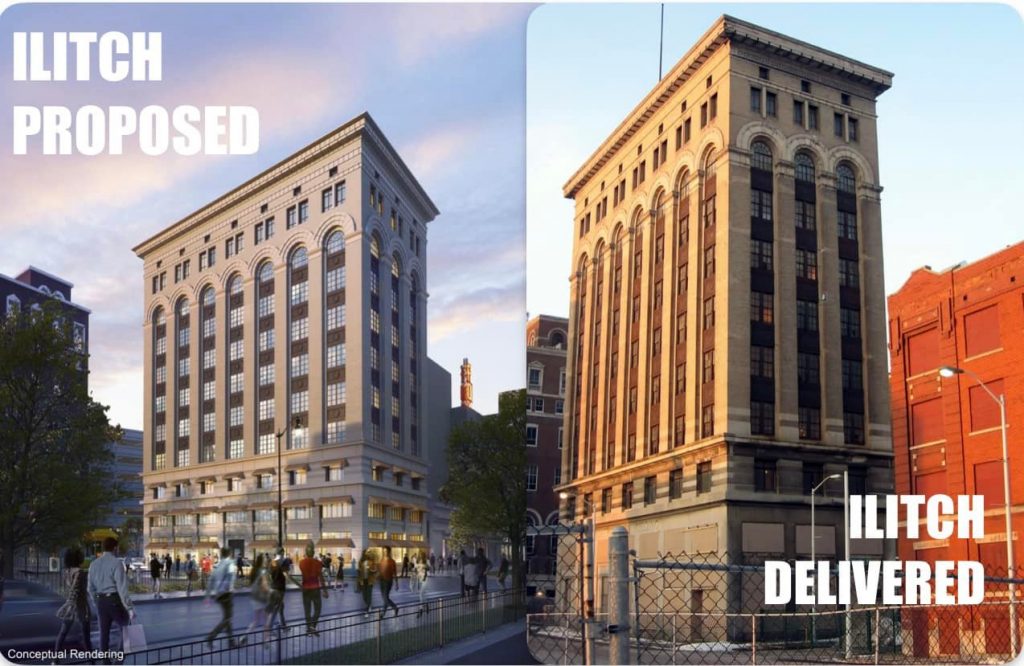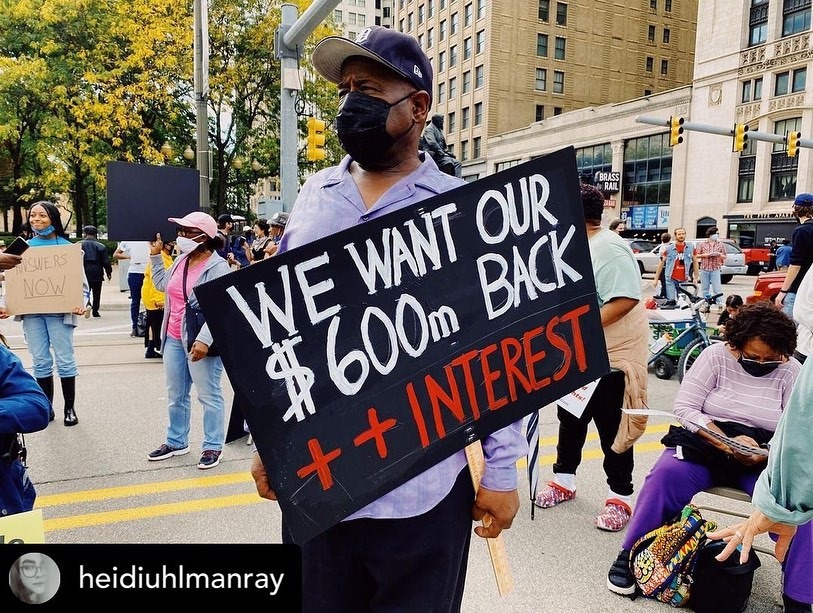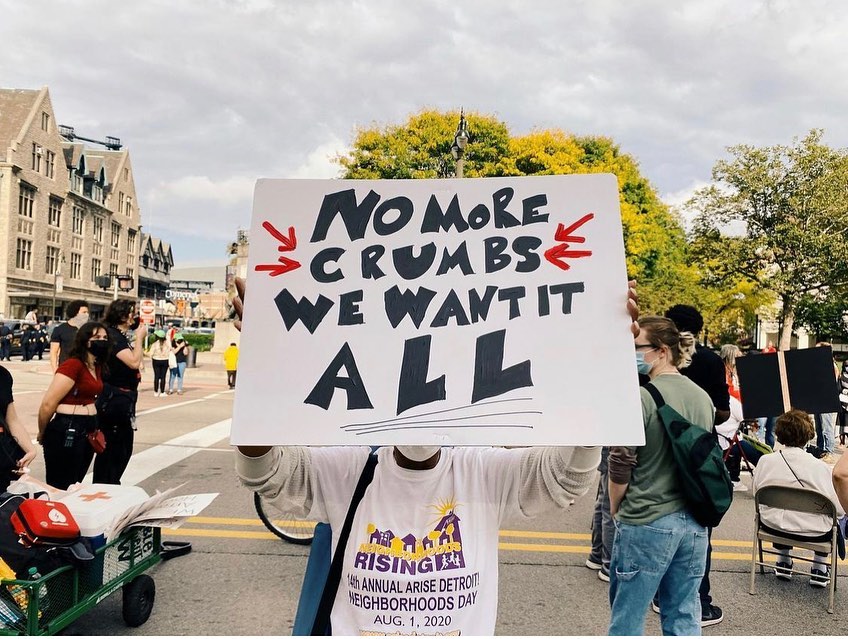In a majority Black and Brown, working-class city experiencing an unprecedented housing crisis, billionaire developers are seeking to siphon public funds that should be used to build public housing and expand community resources to subsidize luxury apartments, hotels, and office space. Community members have spoken out against publicly funding the development scheme but have yet to unite an opposition capable of stopping it or even winning major concessions.
The Developers and the Fight for Community Benefits
A proposed development, to be constructed in the heart of Downtown Detroit, the long-promised but never realized “District Detroit”, is seeking nearly 800 million dollars in public subsidies and tax breaks. The billionaires making this request are the Illitch family — owners of Little Caesars Pizza, several entertainment venues in Detroit, and the Detroit Red Wings and Tigers sports teams — and Stephen Ross — a national real estate mogul, equity manager, and entrepreneur, who also owns the Miami Dolphins.
Because of the proposed development’s large scale and demand for public subsidy, a community benefits agreement (CBA) process is legally required. Detroit’s CBA process was created by a petition drive led by social justice organizations to create a Community Benefits Ordinance (CBO) in 2016, although the final CBO that got implemented was a watered down counterproposal put forward by the Duggan administration. A nine-member Neighborhood Advisory Council (NAC) must reach an agreement with the developers to greenlight the project. The NAC has two elected and seven appointed members who reside in the “impact area” near the proposed development.
The NAC will hold public meetings through mid-February to work out a CBA that must be agreed to by the developer. The District Detroit NAC members are largely friendly to development interests. However, the NAC meetings provide an avenue for working-class residents and community organizations to publicly oppose the project and demand accountability from the city and developers. In the most recent NAC meeting on January 31, dozens of Detroiters attended in person and virtually on Zoom to speak out against publicly funding the development.
The developers, a partnership of billionaires led by the Illitch family’s Olympia Development, want the public to pay for over half the costs of the $1.5 billion “District Detroit,” ten buildings that they will privately own in downtown Detroit. The Illitches’ first proposed to build District Detroit as early as 1994, promising an entertainment district that never materialized. Frustration and distaste for the billionaires deepened as they notoriously received dozens of properties from the city for just $1, while neglecting upkeep and turning much of their downtown holdings into pay-for-parking lots. In 2014, in the midst of Detroit’s bankruptcy proceedings, the Illitches received nearly $400 million in public subsidies to build Little Caesars Arena (LCA). This deal ended the Red Wings’ revenue sharing with the city from ticket sales, naming rights and other marketing deals, which used to bring $7 million per year to the city’s general fund. The Illitches’ current ask for $797 million in public incentives is a reboot of earlier pitches to spur developments surrounding the arena.

Far from acting in the interests of the residents, city officials have done their best to facilitate the District Detroit development process in favor of the capitalists. Every city department and even quasi-public departments involved in this development have given it the thumbs up. All of these departments and boards ignore the longstanding testimonials about the damage these deals inflict on the long-standing Black, Brown, and working-class community of Detroit. A few more approvals need to be secured before the development can become real, however, including the NAC’s CBA and a vote by the City Council.
Facts about the Proposed Public Incentives Wanted by Developers
Much of the public financing would come in the form of tax captures, where the developer pockets state tax money directly from workers’ checks and downtown sales. The rest of the public funding would come from tax increment financing (where the developer is reimbursed taxes), abatements (where the developer does not have to pay taxes), and loans. The developer’s request for a total of $797 million in incentives includes:
- $616 million in “transformational brownfield plans” (TBP), awarding tax reimbursements and tax captures for 35 years. The TBP legislation, passed by the State of Michigan in 2017, allows an unprecedented amount of tax breaks to be awarded to large-scale developments. The bill was backed by billionaire real estate mogul Dan Gilbert, TBP’s first recipient. Last year, Michigan Governor Gretchen Whitmer, a Democrat, supported weakening legislative requirements to award TBPs.
- $133 million in tax abatements. This includes $37 million in Neighborhood Enterprise Zones, a program to incentivize residential investment in select areas of the city, and $96 million in commercial property tax abatements.
- $48 million in Downtown Development Authority (DDA) funding. The DDA exists to keep development money downtown: property taxes generated downtown are captured by the DDA and required to be spent downtown, so they do not recirculate to the neighborhoods. Already the DDA approved $23.75 million from a new loan fund for “affordable” housing, as well as up to $25 million to reimburse infrastructure improvements to the District Detroit site.
In recent years, the question of public incentives for development has increasingly become a hot button issue. Last summer, Dan Gilbert, who owns more of downtown Detroit than even the Ilitches, faced huge pushback for requesting $60 million over 10 years. This topped off over $600 million he had already secured through TBP in 2018 to finance the Hudson, a downtown hotel and mixed-use high-rise. In a surprise 5-4 vote during their last session before summer break, City Council approved the $60 million deal. One councilperson switched their vote to “No” that day because “it was not noticed for the public that this was going to be a vote today.” Despite the undemocratic measures it took to push the deal through, petty bourgeois promises of job creation, small business support, and neighborhood beautification convinced some “progressive” City Council members to cut a weak deal acceptable to the union bureaucracy and small business community, undermining the stated opposition of working-class Detroit.
The Need to Mobilize for Equitable Development in Detroit
The importance of housing justice has emerged as a dire need for Detroiters. Before the pandemic, housing justice activists and groups like Charlevoix Villages Association (CVA), a neighborhood association living in the midst of a gentrifying area, criticized the city’s policies for leading to displacement, resegregation, and gentrification. In 2021, long-term Detroiters and supporters shut down a section of Woodward Ave in the middle of downtown to demand affordable housing, home repair grants, and reparations for overtaxation as a major priority. Their efforts put pressure on developers and the city to provide more units of affordable housing at rates that are reasonable for working-class and poor residents and families and that would be protected as affordable for a longer duration.

For instance, the federal standard of “affordable” is calculated using rates for the metropolitan area, which has a two-person household area median income (AMI) of $62,800, compared to Detroit City’s $30,000. Over the past five years, activist efforts exposed that applying the federal standard of 80 percent AMI as the bar for “affordable” justifies rental units at twice what the average Detroiter can actually afford.
This background can help contextualize the hype around affordable housing in the District Detroit. While the project plan is to rent 80 percent of its 695 units at market rate, astronomically beyond the reach of a typical Detroiter, the other 20 percent, 139 units, will be rented at lower rates, at 50 percent AMI. This is reasonable for Detroiters making slightly below median income. The 50 percent AMI rate sets a new precedent, and it demonstrates that agitation and organizing can change a bar that once seemed immovable.
Nevertheless, community groups like CVA have called for at least half of all new rental units to be affordable at rates Detroiters can afford, so between 30 percent and 50 percent AMI.
The public NAC meetings for the District Detroit have seen some members of the community offer up criticism and doubt about the project and the benefits it would have for many in the city. Among those critical voices was Toyia Watts, president of CVA. At a NAC meeting on January 10, Watts spoke to the NAC and developers, asking that they “don’t take that Motown from downtown for the new town. Keep that soul in the city of Detroit… Keep us in mind, because Black folks are still here.” Her words were met with applause and assent by many gathered in the auditorium. Watts expresses the legitimate desire of long-term residents to have control of what changes take place in their city, so they can ensure it benefits them. The legacy of segregation and racism in Metro Detroit makes this fight for community control and equitable development an important one that will shape what spaces and opportunities are open to Black and Brown poor and working-class Detroiters.
The developers and city planners have downplayed such oppositional public comments at the weekly NAC meetings. Previous NAC processes operated in the same way to push through weak CBAs. This is why the community members who oppose publicly funding the District Detroit need to join forces to strategize an intervention if they want to push the NAC to demand more from the developers and pressure the City Council not to sell out the people of Detroit in this deal.
Detroiters’ Needs Deserve to be Addressed
So far, only one NAC has rejected approval for a development because it didn’t offer up enough benefits for the community. In this exceptional case, members of the NAC and the community argued against compromising on community needs for the benefit of a developer. Members of the District Detroit NAC and community members who mobilize to these meetings should adopt such an attitude: do not compromise on the needs of the long-term working class Black and Brown Detroiters.
While developers appeal to labor by promising jobs and other community benefits, they are notorious for not delivering on their end of the deal. Detroit’s billionaires have overpromised and underdelivered on job creation and revenue generation, as tenancy is falling in downtown office space. Furthermore, even if construction jobs for skilled trades workers are generated in the short term, publicly subsidizing large scale developments does not secure jobs or other benefits to working-class residents in the long term. A variety of academic research has challenged the claim that publicly subsidizing large-scale developments actually delivers the jobs and other community benefits developers promise to secure public financing.
For too long, the concerns of Black and Brown residents have been ignored and resisted by an economic and political structure that is racist and exploitative to its core. It’s the same system whose cops kill Black and Brown people facing mental health crises or simply sleeping in their own beds like Breonna Taylor. Justice has been denied to Detroiters. There is no reason why members of the NAC or anyone in Detroit should allow the needs of Detroiters to go unanswered by billionaires who have benefited from this structural inequality, a structure that these same billionaires fight to maintain.
To seriously deal with the crisis facing Detroit, the demands raised by CVA – home repair grants, affordable housing, and reparations for overtaxation – are truly important, but not nearly enough. Only public housing under the control of the community could provide housing stability for residents. There is no amount of individual private property ownership that can take away the housing instability facing the working class, particularly after the 2008 financial crash and mortgage crisis showed how intertwined financial speculation is in people’s homes. Housing, bought and sold on the market like any other commodity, is incompatible with providing everyone in our unequal society with the dignified shelter they deserve and can afford. Under capitalism there’s simply no way to provide quality housing that low-income people can afford. The rich have only consolidated their wealth since the pandemic, at the expense of the working class and oppressed.
Only collectively owned property on a mass scale can restabilize what is wrong with this system. Collective ownership by the working class and oppressed of all property includes physically and financially expropriating all private holdings of the capitalists and developers (not individual homeowners). Besides, none of these large-scale projects are possible to build without public money, meaning the public has been taking on the risk for private gain. This is lunacy. If we are using public money to build houses and developments, they must be publicly and democratically owned and operated, and funded at a level to protect public welfare.
Even a good CBA isn’t good enough for Detroit: we need public housing. To make this demand real, the Left has the arduous and eagerly awaited task ahead of us to create a political program around housing and development that can unite the labor movement and social movements to fight for joint demands that deal with both exploitation and oppression.











